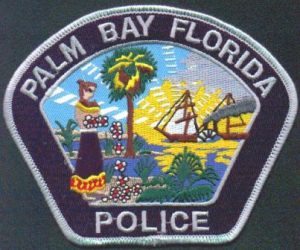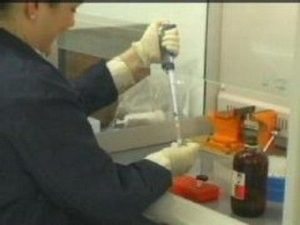DNA: Are The Police Going Too Far?
In 2009, Ruben Mitchell, a Stockton, California resident was arrested for trafficking drugs from California to Pittsburgh. Authorities alleged that Mitchell filed a claim for a lost bag on a Southwest airline flight bound for Pittsburgh. Normally, that wouldn’t be a problem, but Mitchell’s bag contained 19 kilos of cocaine.
Ruben Mitchell
Mitchell, upon arrest, refused to provide a DNA sample, arguing that authorities needed a search warrant to obtain that sample. Later, a federal judge in Pittsburgh agreed.
Assistant U.S. Attorney Laura Irwin claims that taking a DNA sample is no different than fingerprinting someone at the time of their arrest. But is swabbing the inside of someone’s mouth really the same as taking fingerprints? Or, is that step actually a body cavity search that would normally require a search warrant? The difference could be that DNA contains a person’s genetic code, not just a bunch of ridges that’re used to identify that person. And, to stick something inside a person’s mouth to retrieve a sample, well, that’s certainly much more invasive than holding a finger over a glass screen to electronically record a fingerprint.
Either way, the case is going to an appeals court for a ruling on the matter. But it won’t end there. Nope. This is a 4th Amendment issue (unreasonable search and seizure). So we’ll definitely see this case before the U.S. Supreme Court because neither side will give in.
So how will all this play out for departments like the Palm Bay Florida Police Department that currently uses DNA to solve many of their cases, including property crimes?
Palm Bay PD has built an in-house DNA database by collecting samples (150 per month, or so. Nearly 13,000 in four years) from any arrestee who agrees to submit one, not just convicted felons. In fact, PBPD detectives even collect samples from soda cans, doorknobs, cigarette butts, or anything else a person may have discarded or touched in a public place.
Then officers collect and enter that person’s DNA into the department’s local DNA databasing system (LODIS).
Palm Bay officials say their DNA database has paid off big time. Within a period of two years they’ve reduced property losses by a staggering $6 million. And they’ve done so by getting the burglars off the street by using DNA to identify them.
One particular Palm Bay DNA case that made the news was interesting, to say the least. But was it a case where DNA should have been used to find the suspect? Well, you be the judge. Remember, to process each sample the costs range between $100 – $800. And that doesn’t include police manpower, vehicle costs, dispatcher’s time, paperwork, court time, overtime, investigation time, follow up time, transportation to the lab, etc.
Anyway, police officers were called to a burglary scene where they discovered a broken piggy bank and knife lying on the bed beside it. Officers took DNA samples and 30 days later they arrested 19-year-old Jerome Jordan for breaking the bank and stealing the $121 he’d found inside.
Officers were able to identify Jordan as the suspect because his DNA profile was in the local database for an unrelated sample collection, possibly from a soda can he’d tossed in a mall garbage can in front of a police detective who decided it might be a good idea to collect it.
What do you think? Should the police be allowed to collect DNA samples from items collected in public places? Should authorities even be allowed to collect DNA samples from everyone who’s been arrested, but not yet convicted of a crime? Is this over-reaching? A violation of search and seizure according to the 4th amendment?









As a retired Fed, I’m afraid I have to come down on the side of the police in these instances. When it comes to something you discard in a public place, my interpretation would be that in these settings you have no expectation of privacy–your sanctuary was not invaded, indeed, you casually tossed something away for all and sundry to use as they saw fit. You didn’t expect someone to intercept it, granted, but you took no care to insure they didn’t. Your loss. Score one for the good guys.
In fact, isn’t this why we’re counseled to shred all identifying documents before throwing them in the trash–to avoid them falling into the wrong hands? Once something is set out on the curtilage, or discarded in a public place, citizens implicitly give up their right to protect that item.
In terms of the uber-invasive mouth swab–is a person’s right to keep their skin follicles to themselves really more important than that murder victim’s right to justice? Geez, stabbed seventy-one times? Really? I have a hard time mustering any sympathy for the poor misunderstood, when the stakes are that high. And let’s not forget, DNA is also used to EXCLUDE suspects; it’s not exactly an easily misused science. I started out on the liberal side of the house, but after thirty-two years, I’m afraid I just don’t see a mouth swab as that big a deal–not when it’s stacked up against all the potential good that painless, two-second test can do.
One final word I’ll weigh in with.
It all depends on the 4th amendment prohibition against unreasonable search and seizure, and how it applies in each case, and how that can be applied to cover future cases.
It’s always changing, but based on the interpretation of a few short sentences.
Fascinating and confusing all at the same time.
As far as anyone voluntarily giving their DNA: if they agreed to it, then I have no problem with it.
If the police have a suspect for a specific crime & he inadvertently gives his DNA (in something used & tossed), I don’t have a problem with that, either.
But just gathering it from someone who looks like they might commit a crime or might have committed a crime at sometime just doesn’t seem right. First of all, the police would have to document when, where & how they collected it. And if the person had not been a suspect of any crime at the time of collection, I’m sure a decent defense attorney could find a way to get it tossed. When DNA comparison can be a valuable tool, why compromise it’s believability?
Interesting and controversial topic and I’m wishy-washy on this whole thing and here’s why:
To my way of thinking:
Cops are the good guys
Criminals are the bad guys
I’m an honest person so I think everyone else is honest, if they aren’t they’re the bad guys. Hubby teases me about this thinking all the time.
I want the bad guys gone
If LEOs have reasonable cause they should be able to get DNA anyway possible
On the other side of my thinking:
I know there are bad cops
I know there are innocent people
I know when I put my trash out its open for anyone that’s why I shred everything.
I believe in a person’s civil liberties, but don’t always agree with the Supreme Court rulings (case in point, allowing the military funeral picketing.
My consensus is: I’ll wait to see what happens.
Steve, In your scenario, the police had reason to follow that man, he was a suspect in a crime. But should they be able to collect your DNA if they see you discard a can into a trash can, for no other reason than to add another citizen’s DNA info to their bank. Take it another step – henceforth, all babies have a DNA sample entered with their birth certificate which police will have access to twenty years later?
I have a couple of thoughts on this. Once an item is discarded, whether it has your DNA on it or not, then it’s fair game for anyone that wants it. How they use it is up them, not to you since you threw it in the trash.
We had a case here in Jacksonville Beach, Fl where this waitress was killed in her apartment. Stabbed like 71 times. Also sexually assaulted. The subject left his DNA on/in her. They finally, after 4 or 5 years came up with a suspect who at the time of the murder lived across the alley from her. He moved to Baltimore shortly after the murder. The PD called him in for interviews, gave him cups of water, soda etc to drink from but he refused to touch any of it. Couldn’t get any DNA from him. So they followed him around Baltimore for a week. Finally one day he spat on the concrete. One of the cops scraped it up and had it processed. Sure it enough. He was the murderer.
So, normally I lean on the side of maintaining our civil liberties. But in discarding items into the trash, or spitting on the ground. Well, I think once you’ve thrown it out, then it’s no longer yours.
As I understand what Lee said above, the Palm Bay PD is collecting this DNA on people arrested who volunteer it. Nothing wrong with that in my opinion.
I really think taking soda cans or cigarette butts out of trash cans to collect DNA is unreasonable. The question is “Are the police above anyone else in their needs?” Should, for example, an investigator for an insurance company be able to take cans out of my trash, retrieve my DNA, and then base my rates on the probability my genes say I have for a certain disease?
The government, and thus the police, are “by the people.” The people were not created for the police force, nor the government, nor the insurance company.
Moreover, there is an issue with the chain of evidence. Let’s say a person of doubtful integrity were to take a cigarette butt of mine and, later, drop it at the scene of a crime? Does that prove I was ever there?
The idea “the cops need all the help they can get” was as valid at the time of writing the Fourth Amendment as it is now. I see no reason why it should be watered down. Doing so merely permits the police to go on a fishing trip for evidence of any wrongdoing.
If I understand this correctly, officers took a DNA sample from the scene of the piggy-bank break in, and the guy was already in the system? Then, I guess that works for me, but what did officers collect the DNA off of? The knife? And I wonder what possessed them to do that, rather than just dust for fingerprints.
I think collecting DNA swabs on an arrestee is a slippery slope. It IS invasive, and not at all like taking fingerprints. As I understand it, doesn’t the detainee have to be informed his interrogation is being recorded, for instance? If so, shouldn’t he also be informed that the Pepsi can he just sipped out of will be swabbed for DNA evidence? This worries me because I automatically go to ‘how can this trip up a person who is truly innocent?’
On the other hand, cops need all the help they can get, and I can imagine at one time or another all law enforcement personnel wished that pesky 4th amendment would just go the way of the washboard, but it IS necessary and right and good. Taking stuff out of trash cans and then collecting DNA off the item is fine, provided there is good reason, which is why I’m assuming a warrant is needed.
I’m not a cop and therefore sketchy on the law, so I’m going hop up on the fence with D. Swords and watch how this plays out.
Folks, when arrested, don’t drink, sneeze, cough, or wet your pants. Wipe that runny nose and those tears of remorse on your sleeve, not on a tissue. And for God’s sake, don’t talk!!! LOL!
Allow me to weigh in on the “pro” side – somewhat. If officers have a reasonable, articulable suspicion to collect a DNA sample from a person, in other words, someone they suspect of a crime, then it’s okay to collect DNA samples from a discarded can or cigarette or spittle on the sidewalk. Much as police can collect evidence from trash set out for the trash hauler. And collecting from “convicted” persons at random is okay(an oral swab is a minimal intrusion.)
But to randomly collect in such a manner from anyone, even persons that an officer knows to be a criminal type – is going too far.
As far as collecting from persons only arrested and not yet convicted – I’ll have to think about that. (How’s that for wishy-washy.) 🙂